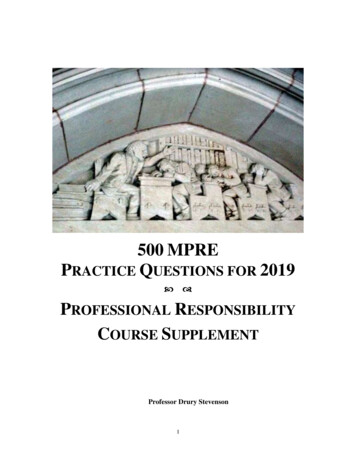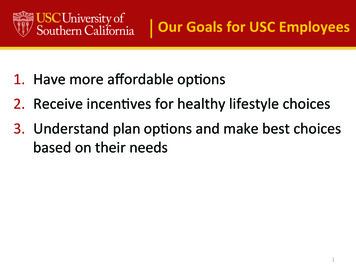
Transcription
500 MPREPRACTICE QUESTIONS FOR 2019 PROFESSIONAL RESPONSIBILITYCOURSE SUPPLEMENTProfessor Drury Stevenson1
2018 Drury D. StevensonCover photo: Stone frieze of law professor lecturing while his students sleep, from the mainentrance of the Yale Law School. Photo Rena Tobey, used by permission.2
Note for law students:These 500 sample questions have the same format and style as the questionson the current Multistate Professional Responsibility Exam (MPRE). Themultiple-choice format also provides a useful way to test students’ knowledgeof each provision or clause in each of the Model Rules, as well as the drafters’official Comments (which the MPRE tests along with the Model Rulesthemselves). No other MPRE practice book currently on the market has asmany sample questions, or as broad coverage, as this book.The practice questions are also extremely useful in mastering the materialcovered in every Professional Responsibility/Legal Ethics course, which is arequired course at every American law school.The arrangement of topics in this book follows the order of how heavily theMPRE tests each Rule. The bar examiners publish useful information on theirwebsite, http://www.ncbex.org/exams/mpre, including a list of all topicstested, and how heavily the exam tests each separate topic:http://www.ncbex.org/pdfviewer/?file %2Fdmsdocument%2F2. This bookfollows that order, but most Professional Responsibility courses do not, butthese practice questions will still give students proficiency in the materialcovered throughout the course, in preparation for their final exam.This compendium of questions is a supplement to the author’s recentlypublished Glannon Guide to Professional Responsibility (2nd ed.). TheGlannon Guide provides detailed explanations for each of its questions (morethan 220 questions), as well as a helpful introduction to each topic. This bookprovides only an answer key and a few citations to Model Rule subsections,the Restatement (Third) of the Law Governing Lawyers, ethics opinions, andcourt cases, but it has more questions. In addition, this book devotes specialattention to topics covered less thoroughly in the Glannon Guide and otherlaw school courses materials, such as attorney-client privilege and legalmalpractice. For best results, use the two books together.“Rule” in the hints after the questions refers to the applicable provision of the ABAModel Rules of Professional Conduct (2018), the primary basis for the MPRE.“Restatement” in this book refers to the American Law Institute’s RESTATEMENTOF THE LAW (THIRD) - THE LAW GOVERNING LAWYERS. Many of the questionstarget from illustrations in the Restatement, examples in the MRPC Comment, orrecent cases.3
4
Table of ContentsPART I – HEAVILY TESTED SUBJECTSConflicts of interest (12–18% MPRE) . . . 9The Client-Lawyer Relationship (10–16% MPRE) . . . 45Litigation & Other Forms of Advocacy (6–12% MPRE) . . . 70Competence, Diligence, Malpractice, & Other Civil Liability(6–12% MPRE) . . . 96PART II – LIGHTLY TESTED SUBJECTSClient Confidentiality & Privilege (6–12% MPRE) . . . 111Regulation of the Legal Profession (6–12% MPRE) . . . 134Communications About Legal Services (4–10% MPRE) . . . 167Different Roles of the Lawyer (4–10% MPRE) . . . 175Transactions and Communications with Persons Other Than Clients (2–8%MPRE) . . . 179Safekeeping Funds and Other Property (2–8% MPRE) . . . 189Code of Judicial Conduct (2–8%) . . . 192ANSWER KEY . . . 195Index of Model Rules . . . 2035
6
PART I:HEAVILYTESTEDSUBJECTSon theMPRE[NOTE: In the author’s law school courses on Professional Responsibility, PART I is material covered in the first half of the semester.If the class has a midterm exam, only the material in Part I is on the midterm.]7
8
CONFLICTS OF INTERESTRule 1.7Conflict of Interest:Current Clientsa competing firm. If found guilty, both Mr.Burns and Conglomerate Corporation will besubject to civil and criminal penalties under stateand federal antitrust laws. An attorney has beenrepresenting Conglomerate Corporation. She hasconducted a thorough investigation of the matter,and she has personally concluded that no suchpricing discussions occurred. BothConglomerate Corporation and Mr. Burns planto defend on that ground. Mr. Burns has askedthe attorney to represent him, as well asConglomerate Corporation, in the proceedings.The legal and factual defenses of ConglomerateCorporation and Mr. Burns seem completelyconsistent at the outset of the matter. Would theattorney need to obtain informed consent to aconflict of interest from both Mr. Burns and aseparate corporate officer at ConglomerateCorporation before proceeding with this dualrepresentation?a) Yes, the likelihood of conflicting positionsin such matters as plea bargaining requiresthe attorney to obtain the informed consentof both clients before proceeding with therepresentation.b) Yes, because it will always be in the bestinterest of a corporation to blame theindividual who acted in the situation, toavoid liability under a theory of respondeatsuperior.c) No, because their legal and factualassertions appear identical in this case, sothe risk of contradiction or adverse positionsin the litigation is de minimis.d) No, because no one else at ConglomerateCorporation would be able to provideeffective consent to the potential conflict ofinterest on behalf of the organization, if thechief executive officer has required the dualrepresentation to occur.1. Conglomerate Corporation owns a little morethan half the stock of Giant Company.Conglomerate’s stock, in turn, is public,available on the public stock exchange, as is theremainder of the stock in Giant Company. Thepresident of Conglomerate Corporation hasasked Attorney Stevenson to represent GiantCompany in a deal by which Giant would makea proposed transfer of certain real property toConglomerate Corporation. The property inquestion is unusual because it contains anunderground particle collider used for scientificresearch, but also valuable farmland on thesurface, as well as some valuable mineral rightsin another part of the parcel. These factors makethe property value difficult to assess by referenceto the general real-estate market, which means itis difficult for anyone to determine the fairnessof the transfer price in the proposed deal. Wouldit be proper for Attorney Stevenson to facilitatethis property transfer at the behest of thepresident of Conglomerate, if AttorneyStevenson would be representing Giant as theclient in this specific matter?a) Yes, because Conglomerate Corporationowns more than half of Giant Company, sothe two corporate entities are one client forpurposes of the rules regarding conflicts ofinterest.b) Yes, because the virtual impossibility ofobtaining an appraisal of the fair marketvalue of the property means that the lawyerdoes not have actual knowledge that the dealis unfair to either party.c) No, because the attorney would be unable toinform either client fully about whether theproposed transfer price would be in theirbest interest.d) No, not unless the attorney first obtainseffective informed consent of themanagement of Giant Company, as well asthat of Conglomerate, because theownership of Conglomerate and Giant is notidentical, and their interests materially differin the proposed transaction.RESTATEMENT § 1313. An attorney decides to purchase “litigationcost protection” insurance for matters shehandles on a contingency fee basis. Plaintiffs’lawyers can buy this type of insurance on a caseby-case basis, for a one-time premium payment.The insurance is available for purchase up tothree months after the filing of the initialcomplaint. Note that this policy is separate andRESTATEMENT § 1312. Mr. Burns, the chief executive officer ofConglomerate Corporation, now faces criminalcharges of discussing prices with the president of9
distinct from malpractice liability insurance. Thepurpose of this type of insurance is to reimbursethe attorney for litigation costs advanced by theattorney - only in the event of a trial loss. Do theModel Rules of Professional Conduct prohibitthe attorney from purchasing litigation costprotection insurance for her contingency feecases?a) Yes, because the client and the attorney mayhave different cost-benefit calculations.b) Yes, for an attorney may prefer that hisclient accept a low settlement offer to ensurethat the attorney receives his fee, while theclient wants to reject a settlement offer andtake his chances at trial.c) No, insurance coverage is categoricallyoutside the scope of the Model Rules.d) No, the attorney may purchase litigation costprotection insurance so long as she does notallow the terms of the coverage to adverselyaffect her independent professionaljudgment, the client-lawyer relationship, orthe client’s continuing best interests.legal counsel regarding the arrangement,that other lawyers may advance the client’scosts without charging the client the cost ofa litigation cost protection policy; and theclient gives informed consent in writing,while the lawyer maintains independentprofessional judgment.c) No, because the client and the lawyer havedifferent cost-benefit calculations in thisscenario.d) No, lawyer may not include in a client’s feeagreement a provision allowing the lawyer’spurchase of litigation cost protectioninsurance and requiring reimbursement ofthe insurance premium from the client’sfunds in the event of a settlement orfavorable trial verdictN.C Formal Ethics Op. 2018-65. Mr. Burns, the chief executive officer ofConglomerate Corporation, now faces criminalcharges of discussing prices with the president ofa competing firm. If found guilty, both Mr.Burns and Conglomerate Corporation will besubject to civil and criminal penalties under stateand federal antitrust laws. An attorney has beenrepresenting Conglomerate Corporation. She hasconducted a thorough investigation of the matter,and she has personally concluded that suchpricing discussions did in fact occur. Both Mr.Burns and Conglomerate Corporation havestopped their denials, and they now concede thatthe pricing discussions took place. One of Mr.Burns’ defenses will be that the former generalcounsel of Conglomerate Corporation hadadvised Mr. Burns that a discussion of generalpricing practices with a competitor would not beillegal. In contrast, Conglomerate Corporationdenies that this was the legal advice given, andinstead asserts that Mr. Burns acted withoutauthority. Given these facts, would it be properfor the attorney to proceed with the dualrepresentation, if both Mr. Burns and a separatecorporate officer at Conglomerate providewritten consent to any potential conflict ofinterest between them?a) Yes, because their legal and factualassertions appear identical in this case, sothe risk of contradiction or adverse positionsin the litigation is de minimis.b) Yes, although the likelihood of conflictingpositions in such matters as plea bargainingrequires the attorney to obtain the informedN.C Formal Ethics Op. 2018-64. An attorney purchased “litigation costprotection” insurance at the outset ofrepresenting a plaintiff in a personal injury case.When the attorney recovered funds for the clientthrough a settlement or favorable trial verdict,the attorney proposed to receive reimbursementfor the insurance premium from the judgment orsettlement funds. The attorney disclosed the costof the insurance to the client as part of therepresentation agreement. Was it proper for theattorney to include in a client’s fee agreement aprovision allowing the attorney’s purchase oflitigation cost protection insurance and requiringreimbursement of the insurance premium fromthe client’s funds in the event of a settlement orfavorable trial verdict?a) Yes, because the Model Rules do notpurport to regulate insurance for lawyers,which is a matter of state statute.b) Yes, if the amount charged to the client isfair and reasonable, and the lawyer fullyexplains to the client what litigation costprotection insurance is, why the lawyerbelieves a litigation cost protection policywill serve the client’s best interests, that theclient should get the advice of independent10
consent of both clients before proceedingwith the representation, dual representationis permissible if each party consents.c) No, because it will always be in the bestinterest of a corporation to blame theindividual who acted in the situation, toavoid liability under a theory of respondeatsuperior.d) No, the conflicting positions betweenConglomerate and Mr. Burns are so greatthat the same lawyer cannot provideadequate legal representation to both, soconsent to the conflict is ineffective.7. An attorney sued Giant Company on behalf ofa client in a personal injury matter. During theprotracted litigation that ensued, Conglomeratebought Giant Company. The attorney wasalready representing Conglomerate in aregulatory compliance matter before a federaladministrative agency. Assuming thisdevelopment was unforeseeable at the outset ofrepresenting the client against Giant Company,will the attorney have the option to withdrawfrom one of the representations to avoid theconflict?a) Yes, because one matter is in state court andthe other matter is a completely unrelatedfederal administrative proceeding.b) Yes, but the attorney must seek courtapproval where necessary and take steps tominimize harm to the clients, and he mustcontinue to protect the confidences of theclient from whose representation the lawyerhas withdrawn.c) No, if a conflict arises after representation isunderway, the lawyer ordinarily mustwithdraw from the representation of bothclients, unless the lawyer has obtained theinformed consent of each client at the outsetof the representation.d) No, because the federal administrativematter would preempt state tort law underthe Supremacy Clause.N.C Formal Ethics Op. 2018-66. Big Firm represents hundreds of corporateclients out of a dozen offices in different states.The firm has no formal procedures in place tocheck for conflicts at the outset of representationfor new clients, but the managing partner of thefirm has an incredible memory and has neverfailed to spot a potential conflict of interest in thepast. An attorney agrees to represent a newcorporate client that owns many subsidiaries, andchecks with the managing partner, who assuredAttorney there are no potential conflicts. Afterthe new corporate client had disclosed asubstantial amount of confidential information, itemerged that some of its subsidiaries weredirectly adverse to other clients of Big Firm.The attorney was completely unaware of thepotential conflicts at the time he agreed to therepresentation, despite asking the corporateclient a few questions about the opposing partiesin pending litigation it might have. Will theattorney be subject to discipline for not decliningrepresentation in this case?a) Yes, because ignorance caused by a failureto institute reasonable procedures,appropriate for the size and type of firm andpractice, will not excuse a lawyer's violationof the Rules regarding conflicts of interest.b) Yes, because there is a presumption that acompany owning several subsidiaries willhave at least one adverse interest to otherclients of a Big Firm.c) No, as he was unaware of the conflict at thetime, but now that the conflict is apparent,Attorney must withdraw from representationd) No, because the attorney at least partlyrelied upon the managing partner’s prowessin identifying conflicts, given that themanaging partner had never before made amistake.8. A husband and wife decide to divorce andreach an agreement to share the same lawyer inhopes of saving money. They hire an attorney torepresent each of them in Family Court for thedissolution of marriage. The attorney explainsthat there is an obvious conflict of interest here,but the husband and wife insist, and signinformed consent forms waiving the conflict andtheir rights to assert any future claims related tothe conflict. The husband and wife have nochildren, and they have always kept separatebank accounts. Each purchased their own carfrom the money in their own bank account andeach car’s title is in only one name. They live inan apartment whose lease is expiring soon, sothere is no real property to divide. Would it beproper for the attorney to represent both in thedivorce?a) Yes, because it appears on these facts thatthere will be no assets in dispute at all, sothe theoretical conflict of interest wouldhave no bearing on their case.11
b) Yes, because both clients consented inwriting, the dual representation does notviolate law, and the attorney could have areasonable belief that he will be able toprovide competent and diligentrepresentation to each affected client.c) No, because contingent fees are notpermissible in divorce cases, and thehusband and wife’s sole motivation insharing a lawyer was to save money.d) No, because the representation involves theassertion of a claim by one client againstanother client represented by the lawyer inthe same litigation or other proceedingbefore a tribunalthe same litigation or other proceedingbefore a tribunal.b) Yes, because the mere possibility ofsubsequent harm does not itself requiredisclosure and consent.c) No, the situation is likely to limit materiallythe attorney’s ability to recommend oradvocate all potential positions that eachmight take because of his duty of loyalty tothe others; representing the group’s overallinterests in effect forecloses alternatives thatwould otherwise be available to the client.d) No, because the fact that the individualsalready decided to create a joint venture, andsought representation together from a singlelawyer, constitutes implied consent to thecommon representation despite any potentialconflicts of interest involved.9. Three individuals plan to form a joint ventureand ask an attorney to represent them in draftingthe necessary documents and making thenecessary filings with government agencies.They have already agreed that everyone willcontribute exactly one-third of the startup fundsfor the venture, each will own a one-third share,each will have equal control over the Board, andeach agrees to indemnify the others for a onethird share of any personal liability related to thejoint venture. They have also agreed that theywill have no non-compete agreements. The jointventure will hire managers, marketers, and otheremployees to operate the business. The threeindividuals are co-owners of a patent that couldpotentially be very lucrative when they bring itto market, and they have known each other andworked together for a long time. The attorneycannot find any current areas of conflict betweenthem, though he knows that it is technicallypossible that some unforeseen conflict couldarise in the future. The shared objectives andgoals of the group lead the attorney to concludethat no conflicts of interest are present and that itwould be counterproductive to try to convinceeach member of the group to sign an informedconsent form acknowledging that conflicts ofinterest exist and that the attorney may stillrepresent everyone at once. May the attorneytrust his professional judgment and proceedwithout obtaining separate consent forms fromeach person in the joint venture?a) Yes, if the attorney has a reasonable beliefthat he will be able to provide competentand diligent representation to each client,because the representation does not involvethe assertion of a claim by one client againstanother client represented by the lawyer in10. A client owns a partnership share of aclosely-held business, and the other partners voteto impose an involuntary buy-out of the client toremove him from the firm. The client is clearlyupset about this, but the partnership agreementclearly permits involuntary buyouts by amajority vote of the other shareholders. Then theclient hires an attorney to represent him in thebuyout transaction, to review the necessarydocuments and provide legal counsel about it.No litigation is under consideration yet. Theattorney’s sister is also a lawyer in that city, atanother firm, and the sister represents the othershareholders in the partnership. Nevertheless,the attorney did not disclose that her sisterrepresented the other partners, as she and hersister are not close and rarely speak, and thematter is unlikely to turn into litigation. Is theattorney, or the other lawyers in her firm, subjectto disqualification in this matter?a) No, because the attorney and her sister arenot close enough for there to be a substantialrisk that they will share confidentialinformation, and the matter seemed unlikelyto turn into litigation.b) No, so long as both sisters give informedconsent in writing, and each believes thatshe will be able to provide competent anddiligent representation to her clientc) Both the attorney and her firm would besubject to disqualification, because the clientdid not give written informed consent.d) The attorney would be subject todisqualification, but ordinarily the otherlawyers in her firm would not be subject todisqualification.12
whatever terms would be best for the jointventure overall, rather than what would be mostbeneficial for each one individually. The sharedobjectives and goals of the group lead theattorney to conclude that no conflicts of interestare present and that it would becounterproductive to try to convince eachmember of the group to sign an informed consentform acknowledging that conflicts of interestexist, and that the attorney may still representeveryone at once. May the attorney trust hisprofessional judgment and proceed withoutobtaining separate consent forms from eachperson in the joint venture?a) Yes, because the mere possibility ofsubsequent harm does not itself requiredisclosure and consent.b) Yes, assuming the attorney has a reasonablebelief that he will be able to providecompetent and diligent representation toeach client, because the representation doesnot involve the assertion of a claim by oneclient against another client represented bythe lawyer in the same litigation or otherproceeding before a tribunal.c) No, the situation is likely to limit materiallyAttorney’s ability to recommend or advocateall potential positions that each might takebecause of his duty of loyalty to the others;representing the group’s overall interests ineffect forecloses alternatives that wouldotherwise be available to the client.d) No, because the fact that the individualsalready decided to create a joint venture, andsought representation together from a singlelawyer, constitutes implied consent to thecommon representation despite any potentialconflicts of interest involved.11. An attorney has applied to make a lateralmove from her firm to Big Firm, and she hasalready gone through the first two of threerounds of interviews for the position. Then theattorney agrees to represent a client in filing abreach of contract claim against ConstructionCompany over a commercial developmentproject. Big Firm is representing ConstructionCompany, and the firm’s lawyers drafted thecontract that forms the basis of the client’scomplaint. The client claims that ConstructionCompany breached a certain provision of thecontract that is ambiguous; ConstructionCompany is confident that its conduct fallswithin the contractual language in that provision.Is it proper for the attorney to undertakerepresentation of the client in this case?a) Yes, assuming the client gives informedconsent to the representation despite theconflict of interest here.b) Yes, because there is no clear conflict ofinterest here, because the attorney has notyet started working at Big Firm and couldnot have participated at all in drafting thecontract provision that is now in dispute.c) No, as during the previous interviews, theattorney was likely to have gleaned someconfidential information about ConstructionCompany from Big Firm.d) No, because when a lawyer has discussionsconcerning potential employment with anopponent of the lawyer's client, or with alaw firm representing the opponent, suchdiscussions could materially limit thelawyer's representation of the client.12. A group of several individuals seeking toform a joint venture asked an attorney torepresent them in drafting the necessarydocuments and making the necessary filings withgovernment agencies. Two of the individualswere to provide most of the initial funds for thestartup; two others were experienced inventorswho were to provide new product designs; twoothers had expertise in business management andwere to serve as managers; and two had provenrecords in high-end sales and marketing. Theyhave not yet resolved the allocation of ownershipshares, bonuses for managers, whether to haveanti-compete agreements for each participant,whether patents will belong solely to the jointventure or partly to the inventors themselves, andwhether sales reps will work on salary orcommissions. Everyone says that she wants13. Three individuals hire an attorney torepresent them as co-defendants in a tort action.At the outset, the attorney tells them that therecould be a potential conflict of interest if herepresents all three of them, and that they willneed to sign informed consent forms, which theydo. The three individuals have common goalsand interests in the litigation, so they do nothesitate to sign the forms or inquire further aboutthe implications of the potential conflicts. Nofurther discussion occurs about the issue, andAttorney proceeds with the representation.Could the attorney end up having a duty towithdraw from representation later in thelitigation, if the clients gave written consent tothe shared representation at the outset?13
a)Yes, when undertaking representation ofmultiple clients in a single matter, theinformation must include the implications ofthe common representation, includingpotential effects on loyalty, confidentialityand the attorney-client privilege and theadvantages and risks involved.b) Yes, if the liability insurers for the three codefendants disagree on the terms ofsettlement and were unincluded in theoriginal written consent.c) No, because the attorney dutifully obtainedwritten consent from each client, as requiredby the Rules of Professional Conduct.d) No, assuming no situations arise where thelawyer obtains confidential informationfrom one client that he could use to harm theinterests of another client, and none of theclients file a cross-claim against another codefendant.became co-defendants in a lawsuit by adisgruntled former employee. The plaintiffclaimed to have been the victim of genderdiscrimination in the form of a hostile workenvironment, as well as intentional and negligentinfliction of emotional distress related to thesame factual allegations about her treatment atthe workplace. Business Manager hired a certainattorney to represent both himself and the ShiftSupervisor, who had been the plaintiff’s directsuperior. Based on Business Manager’s initialinvestigation and review of the personnel files ofthe plaintiff and the Shift Manager, he believesthe allegations are baseless and that the suit willend in a dismissal or summary judgment beforetrial. Shift Supervisor had a spotless workhistory, but the plaintiff had numerousinterpersonal conflicts with her peers, wasfrequently late for work or missed workcompletely, and was the subject of severalcustomer complaints. From his consultationswith the defendants, the attorney understood thatboth Business Manager and Shift Supervisorwere equally targets of the complaints. BusinessManager and Shift Supervisor both gave theattorney written informed consent to thepotential conflicts of interest in having theattorney represent both. Business Managerobtained tentative permission to have thebusiness cover the legal fees for the attorney.Near the end of the discovery phase, however,plaintiff produced numerous inappropriate loveletters to her from Shift Supervisor, many withexplicit sexual overtures, and a few that soundedthreatening based on her lack of response toprevious letters. In addition, several co-workersof plaintiff gave depositions explaining that theyhad witnessed Shift Supervisor engaging ininappropriate and unwanted touching of plaintiffon many occasions. Several also testified thatShift Supervisor would often accost her for tenor fifteen minutes outside, before she could reachher workstation, and that this was the cause ofher tardiness for work. Business Manager hadnever heard about any of these problems before.Moreover, during depositions the plaintiffexplained that she always had little contact withBusiness Manager and had no direct complaintsabout his treatment of her, and sheacknowledged that she had never complained toBusiness Manager about Shift Supervisor’sharassment of her. She disclosed that BusinessManager was a co-defendant only because herattorney believed it was necessary to namesomeone from upper management in the lawsuitto trigger the legal protections of Title VII and14. Husband and Wife wanted to hire a certainattorney to prepare their wills. Before theformalities of representation were final, husbandspoke with the attorney privately by phone anddisclosed that Husband had been having anaffair, and that his lover might be pregnant.Husband forbids the attorney to tell Wife aboutthis. Then the attorney realizes there could bepotential conflicts of interest between husbandand wife about the wills, distribution of assets,potential challenges to the will by offspring fromoutside the marriage, and potential claims forchild support against Husband’s estate. Would itbe proper for the attorney to proceed withrepresenting Husband and Wife in preparingtheir wills?a) Yes, assuming each provides written consentafter receiving warnings about the potentialconflicts that often emerge in dualrepresentationb) Yes, because this is a transactional matter,not litigation in which adverse claims couldarise.c) No, because the attorney cannot violate theduty of confidentiality to Husband, whichwould be necessary to
to the general real-estate market, which means it is difficult for anyone to determine the fairness of the transfer price in the proposed deal. Would it be proper for Attorney Stevenson to facilitate this property transfer at the behest of the president of Conglomerate, if Attorney Stevenson would be representing Giant as the










